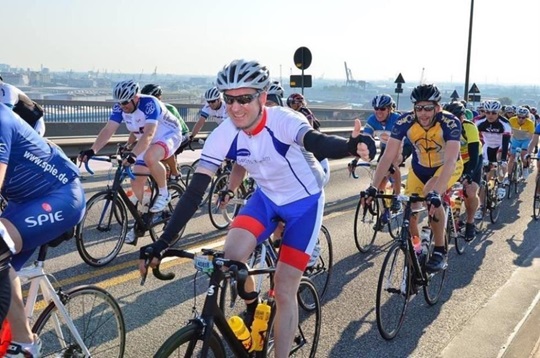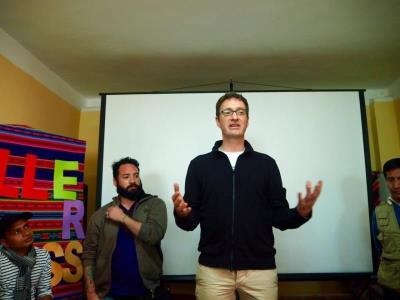HARTMANN CFO and Labour Relations Director Stephan Schulz opens up about his car racing days, steering clear of university, and putting HARTMANN’s next generation of leaders on the fast track to success.

Q: You always keep a rather full schedule. How do you relax and unwind?
Stephan Schulz: Definitely by bike-riding. I was quite active before, participating in triathlons. Unfortunately, I am not able to do that right now for professional and personal reasons. But I do try to stay fit, and cycling in the evening air is a perfect way to unwind.
Q: What was your dream job as a child?
As many boys I wanted to become a fireman or a race car driver. I always tended to go for speed. As you can see now, that remained just a dream. I think I lacked the requisite skill.
Q: It sounds like you gave racing a real try. What happened?
Schulz: I'm still an enthusiastic amateur racing driver to this day, but there is an emphasis on "amateur."
I once had the opportunity to do a test run with a real professional on the Nürburgring. That's where I noticed the difference. Despite the heavy rain, he stepped on the gas and maintained his high speed at 250 kph. Even in dangerous sections of the track, he drove to the very limit. As a professional race car driver you need a certain willingness to die – I never had that.
Q: So what was your favourite subject in school?
Schulz: To be entirely honest, mathematics was always boring, which was due in part to the teachers. I wasn't particularly good at it either. I really liked history and social studies. I didn't get along well at all with Latin and French. In short, my parents didn't have an easy time during my school years.
Q: What was your first summer job?
Schulz: At 16, I worked at a large German supermarket chain where I worked at the checkout and stocked shelves. The hourly pay was eight Deutschmarks. At the time, I was saving for my driving license. That was the first time I became aware of how important working conditions and the work atmosphere are to employees.

Q: After school (Abitur), why did you decide not to attend university?
Schulz: After my unpleasant experiences in school, I had enough of study, and I thought an apprenticeship would provide a very good basis for a career. The decision to complete my apprenticeship at a bank was due in part to my grandfather. He was a banker. He taught me how important it is to be able to manage money.
Q: But you changed your mind about a university education. Why?
Schulz: During the apprenticeship, I realised that a university education is necessary for further success. When starting my career I wanted to remain in the financial industry.
I continued working at a bank during semester breaks, and completed an internship at a management consulting firm. This was one of the first strategic decisions in my career.
Q: How so?
Schulz: I saw real teamwork for the first time. I was integrated and able to collaborate on a wide variety of projects. And then came the second realization of my career: fun impacts your own performance. Whether at work or study, if you enjoy what you're doing, that changes everything. I therefore performed far better in my university studies than in earlier school years.
Q: What brought you to HARTMANN?
Schulz: Before HARTMANN, I was a Managing Director of a medium-sized specialty chemicals company. It was privately held and later taken over by a Dax-listed company. That fundamentally changed the direction of the company leading in favour of the capital markets. Strategic planning was very short-term and that limited the pathway to innovation.
For me, entrepreneurial thinking and action are an important, if not the most important, factor in company management. This means pursuing a long-term perspective. Dr. Rinaldo Riguzzi, then CEO of HARTMANN GROUP, reflected this entrepreneurial spirit. That impressed me. And this long-term thinking is still a precious asset at HARTMANN to this day.
Q: So how was the switch to healthcare?
Schulz: It is very rewarding to deal with people's health in my career and to contribute to improving quality of life. HARTMANN's products and services are aimed at exactly that. We support medical specialists in their work, which in turn improves the quality of care that patients receive. This is a very meaningful duty that goes far beyond the Group's financial results.

Q: In your role as Labour Relations Director, what issues are keeping you particularly busy right now?
Schulz: We've implemented significant changes in our personnel management in the last five years. Putting the right employees with right skills into the right positions is critical to our success. Following this mindset, we've completely revised our tools of personnel management. A central element here is the Leadership Review, that is, an assessment of the performance and potential of our executives. But we equally value the development of our employees too.
Such support extends from our Training Programme for Commercial and Technical Professions and our International Graduate Programme for university graduates to our many promotional measures. Examples include our Talent Development Programme and the newly created Development Dialogue. Providing the optimum conditions for developing and deploying our employees is our responsibility as a company.
Q: How does that look in practice?
Schulz: Personnel management must be much more in sync with the strategic considerations of the divisions, like Wound or Incontinence Management, and throughout the countries.
This means that we actively question whether we have the right employees and sufficient resources to implement a particular strategy, and whether we are investing sufficiently in our staff.
If we want to successfully market complex solutions such as hand hygiene concepts in the Disinfection business segment, we need appropriately qualified employees who can handle exactly this kind of complex solutions. This means that we hold up a mirror to our managers by acting as sparring partners and pace-setters. We pay attention to whether they are sufficiently engaged in developing their employees and investing enough in their qualification. The role of HR is thus becoming more important and critical to HARTMANN's future success. Here we build up the core of our business – our people.
Q: Where do you see yourself in ten years?
Schulz: I imagine that I'll then be passing on the knowledge that I've acquired over my career, for example by teaching at university, supporting start-ups or serving on supervisory boards.
I'd like to be socially involved as well. In short, to make positive things happen and to stay active myself.
